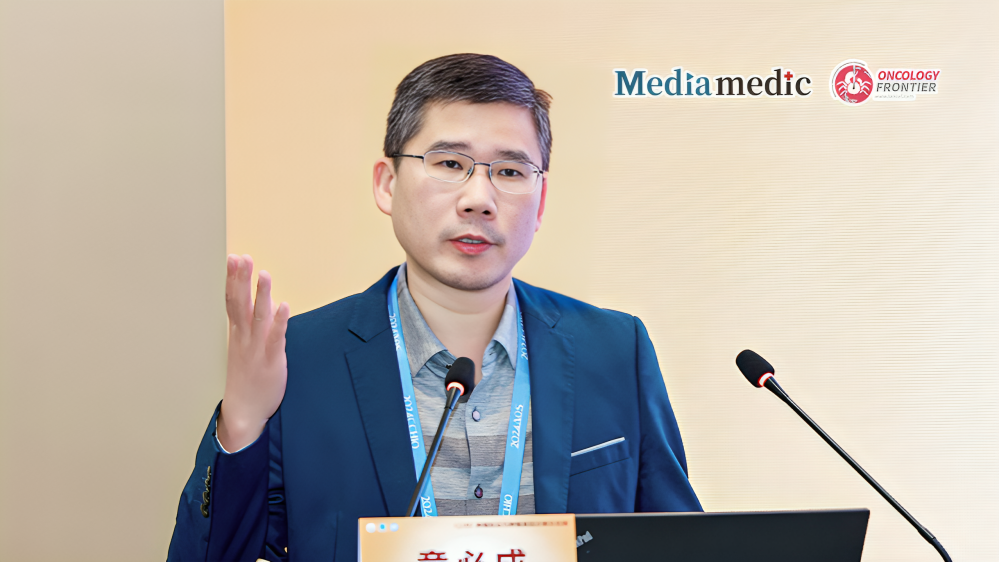Mediamedic shared a post on LinkedIn:
“Editor’s Note: EGFR mutations are among the most common genetic abnormalities in non-squamous non-small cell lung cancer (NSCLC), and EGFR-TKIs have become the standard first-line treatment for advanced EGFR-mutant NSCLC. Despite significant advancements across three generations of EGFR-TKIs, resistance remains unavoidable. Post-resistance treatment options for EGFR-TKI patients, particularly those facing complex third-generation resistance mechanisms, are limited.
- At the 2024 Chinese Congress on Holistic Integrative Oncology (CCHIO) on November 17, Dr. Bicheng Zhang from Wuhan University People’s Hospital delivered a keynote presentation titled “Post-Resistance Strategies for Third-Generation EGFR-TKIs in NSCLC.” His talk explored resistance mechanisms and advancements in treatment strategies. Below is a summary of the key points shared.
Part 1: Resistance Mechanisms and Progression Patterns of Third-Generation EGFR-TKIs
- Resistance Mechanisms
Third-generation EGFR-TKIs, such as osimertinib, have revolutionized treatment by overcoming resistance to earlier generations and effectively controlling brain metastases. However, resistance mechanisms still include:
- EGFR-Dependent Resistance: Mutations blocking TKI suppression of EGFR tyrosine kinase activity.
- Bypass or Downstream Activation: Alternate signaling pathways drive cell survival and proliferation despite TKI binding.
- Histological or Phenotypic Transformation: Includes transitions from adenocarcinoma to squamous or small-cell lung cancer (SCLC) and epithelial-mesenchymal transformation (EMT).
Off-target resistance is more prevalent than on-target resistance.
- Progression Patterns
Post-resistance progression patterns include:
- Oligoprogression: Limited to ≤5 lesions in ≤3 organs.
- CNS Progression: Brain metastases or leptomeningeal involvement.
- Widespread Progression: Requires mechanism-specific treatment adjustments.
Part 2: Strategies for Oligoprogression and CNS Progression
- Oligoprogression
For patients showing limited progression while on EGFR-TKI therapy, combining local therapies (radiotherapy, surgery, or ablation) with continued EGFR-TKI has demonstrated benefits.
- Studies: In a retrospective analysis, patients receiving SBRT consolidation post-osimertinib showed improved progression-free survival (PFS) (17.2 vs. 11.3 months). A Phase II trial (NCT02759835) involving local therapies in osimertinib-treated patients reported encouraging PFS2 outcomes.
- CNS Progression
Approximately 40% of EGFR-mutant NSCLC patients experience CNS progression. Treatment strategies include:
- Dose Escalation: For patients with stable extracranial disease, escalating osimertinib from 80 mg to 160 mg may benefit leptomeningeal disease.
- Local Therapy: Radiotherapy or surgical interventions remain pivotal in managing CNS metastases.
Part 3: Strategies for Widespread Progression Based on Resistance Mechanisms
- C797S Mutation
The C797S mutation is a common EGFR-dependent resistance mechanism post-osimertinib.
- Treatment: Combining first-generation TKIs with osimertinib shows modest benefit but limited durability. Brigatinib with cetuximab offers a potential option for cis-oriented C797S mutations.
- MET Amplification
MET amplification rates post-osimertinib are 7%-30%.
- Treatment: MET-TKIs (e.g., capmatinib) combined with osimertinib demonstrate efficacy. MET-targeted antibody-drug conjugates (ADCs) and bispecific antibodies like amivantamab hold promise.
- HER2 Aberrations
HER2 mutations, amplifications, and overexpression are observed in NSCLC.
- Treatment: Trastuzumab deruxtecan (T-DXd) has shown significant efficacy, with FDA approval for HER2-mutant metastatic NSCLC.
- Histological Transformation to SCLC
Histological transformation occurs in 5%-14% of EGFR-TKI-resistant adenocarcinomas.
- Challenges: Patients often exhibit rapid progression with poor prognoses (median survival: 6-10.9 months).
Part 4: Strategies for Widespread Progression Without Identifiable Resistance Mechanisms
- Immune Therapy Combinations
- Studies: The TATTON trial reported significant immune-related adverse events (22% ILD incidence) with osimertinib + durvalumab. Immune checkpoint inhibitors (ICIs) combined with TKIs are not recommended due to safety concerns.
- Immune Therapy + Chemotherapy
- KEYNOTE-789 and CheckMate722: Both trials failed to show significant PFS or OS improvements for ICIs combined with chemotherapy post-EGFR-TKI failure.
- Immune Therapy + Anti-Angiogenesis + Chemotherapy
- IMpower150: Demonstrated significant OS and PFS benefits for the ABCP regimen (atezolizumab + bevacizumab + carboplatin + paclitaxel) in EGFR-mutant NSCLC post-TKI failure.
- ORIENT-31: Showed significant PFS benefits with sintilimab + chemotherapy + anti-angiogenesis agents, leading to its NMPA approval for EGFR-TKI-resistant NSCLC.
Part 5: Emerging Bispecific Antibodies and ADCs
- Bispecific Antibodies
- Amivantamab: Shows intracranial efficacy and survival benefits in combination with chemotherapy post-osimertinib resistance.
- AK112 (envafolimab): Improves PFS and shows promise as a new standard for resistant EGFR-mutant NSCLC.
- ADCs
- HER3-DXd: Demonstrates promising efficacy in HER3-positive NSCLC with ORR at 29.8% and PFS improvement in ongoing trials.
- TROP2 ADCs: Trop-2-targeted agents like Dato-DXd and SKB264 show significant efficacy in TKI-resistant NSCLC, with ongoing trials.
Conclusion:
Professor Zhang highlighted that while resistance to third-generation EGFR-TKIs remains a significant hurdle, tailored strategies based on resistance mechanisms can improve survival. Key takeaways include:
- Local therapies combined with TKIs are effective for oligoprogression and CNS metastases.
- Bispecific antibodies and ADCs represent the future of treatment, with ongoing trials poised to redefine post-resistance strategies.
- Despite advancements, larger Phase III trials are needed to validate current findings and optimize treatment protocols.
Dr. Bicheng Zhang
- MD, PhD, Chief Physician, Associate Professor, Doctoral Supervisor
- Director, Oncology Department, Wuhan University People’s Hospital Shouyi Campus
- Vice Chair, Expert Committee on Oncology, National Health Commission
- Standing Committee Member, CSCO Immunotherapy and Patient Education Committees
- Member, Chinese Anti-Cancer Association (CACA) Tumor Biomarkers Committee


